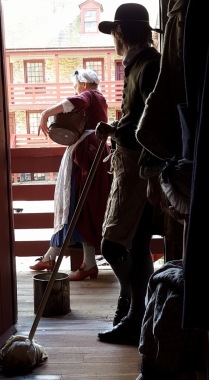Tags
common people, feminism, first person interpretation, interpretation, living history, women's history, women's work

Dude: I am conflicted. There are folks out there doing excellent work, but after reading some recent posts around the interwebs, I kept thinking, “Stockholm Syndrome much?”
I’m as much of a narcissist as the next person, and I think I recognize some of the folks being called out in various places for being critical of women’s roles in living history events. So, organize my own events? Come up with my own things to do?
Cool: challenge accepted.
I am, in fact, throwing down for the pleasure and pain of running a farm in late June. No, I didn’t organize it, but I was asked to take on a challenge and I have accepted, roping my favorite tailor into the effort as well. It’ll mean a bunch of studying, but in a pinch, I can always clean the house. We can rake, make refugees stay in the yard, and try as hard as we can to keep Quakers from putting radical ideas in the slaves’ heads. I think it will be hard, unpleasant, and uncomfortable—and that’s what I don’t like about the suggestions in the otherwise honestly well-intended and meant-to-inspire posts.
They’re so nice. They reinforce women’s subordinate roles in the past and present. Children’s activities? I might die, really, I might. If that’s your bag, go for it, please! We need it. It’s simply not something I can do.
No more can I talk about What People Wore. It’s not that I don’t care (y’all know I do) but that I want to move past the surface.
It’s not enough just to look great.
Dive deep: find the dirt. Find the hard stuff. You don’t have to be nice. That’s my personal problem with what I’ve been reading: between the lines I keep hearing a voice suggesting that we be nice girls, that we simmer down. No, I’m sorry. I can’t. Reader, if you can, go for it.
But if you can’t, I want to tell you: Keep pushing. Keep asking. Keep speaking up. Challenge the status quo. Our Girl History did a great post on Well Behaved Women, and I fully support the work people are doing to represent the Well Behaved and the marginalized (shout out to the veteran with the knife-grinding cart: well imagined, sir!).

John Russell. The Blind Beggar and His Granddaughter, oil on canvas, 18th century. The Bowes Museum UK.
Bring it. Bring the ordinary.
But if you can’t be ordinary or run the children’s games or be subservient or show how women dressed, that’s okay. For the love of god, someone, be desperate.
Be hungry, be angry, be resentful, be religious.
Whatever you do, don’t be afraid to speak your mind.



I tend to demo embroidery, and theres a lot you can do with that to talk about the roles of women in history. one piece I’m working on is essentially a cartoon strip that tells a little story of love and revenge, but I use it as a platform to talk about marriage in the middles ages, because it amuses me that people are outraged about girls being told who to marry, but it simply hadn’t occurred to them that the men were in the same boat most of the time
That’s a nice way to turn marriage practices around and get people to understand the culture better– and a very subversive, unexpected use of embroidery. Love it!
Yep, I collected primary resource (as well as secondary) on dozens and dozens of women doing unusual, unheard-of, unacceptable things in the period. I find it much more interesting, personally, as well as more challenging. And more honest. Poor people, as well, doing what they needed to, to survive.
I got so tired of people saying “but isn’t it incumbent upon us to portray the COMMON?” Well, the more I researched, the broader my defininition of that term “common” became. Women (and men) have always done what had to be done, period.
Right, do we mean common or familiar? Counting up percentages or making assumptions? Figuring out survival occupied a lot more of people’s time in the past than it does for the vast majority of us at most income levels. I begin to think strongly that the more we show– the broader the picture of the past we paint– the better we will understand our present. And that’s a big part of the mission of historical organizations. Sometimes we lose sight of that in our hobby.
I think this is an awesome idea.